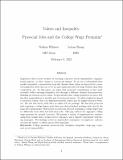Values and Inequality: Prosocial Jobs and the College Wage Premium
Author(s)
Wilmers, Nathan; Zhang, Letian
DownloadAccepted version (1.119Mb)
Open Access Policy
Open Access Policy
Creative Commons Attribution-Noncommercial-Share Alike
Terms of use
Metadata
Show full item recordAbstract
<jats:p> Employers often recruit workers by invoking corporate social responsibility, organizational purpose, or other claims to a prosocial mission. In an era of substantial labor market inequality, commentators typically dismiss these claims as hypocritical: prosocial employers often turn out to be no more generous with low-wage workers than are other employers. In this article, we argue that prosocial commitments in fact inadvertently reduce earnings inequality, but through a different channel than generosity. Building on research on job values, we hypothesize that college graduates are more willing than nongraduates to sacrifice pay for prosocial impact. When employers appeal to prosocial values, they can thus disproportionately reduce pay for higher-educated workers. We test this theory with data on online U.S. job postings. We find that prosocial jobs requiring a college degree post lower pay than do standard postings with exactly the same job requirements; prosocial jobs that do not require a college degree, however, pay no differently from other low-education jobs. This gap reduces the aggregate college wage premium by around 5 percent. We present a variety of supplementary evidence using labor market data, worker survey responses, and a vignette experiment with hiring managers. The findings reveal an unintended consequence of employers’ embrace of prosocial values: it offsets macro-level inequality. </jats:p>
Date issued
2022Department
Sloan School of ManagementJournal
American Sociological Review
Publisher
SAGE Publications
Citation
Wilmers, Nathan and Zhang, Letian. 2022. "Values and Inequality: Prosocial Jobs and the College Wage Premium." American Sociological Review, 87 (3).
Version: Author's final manuscript